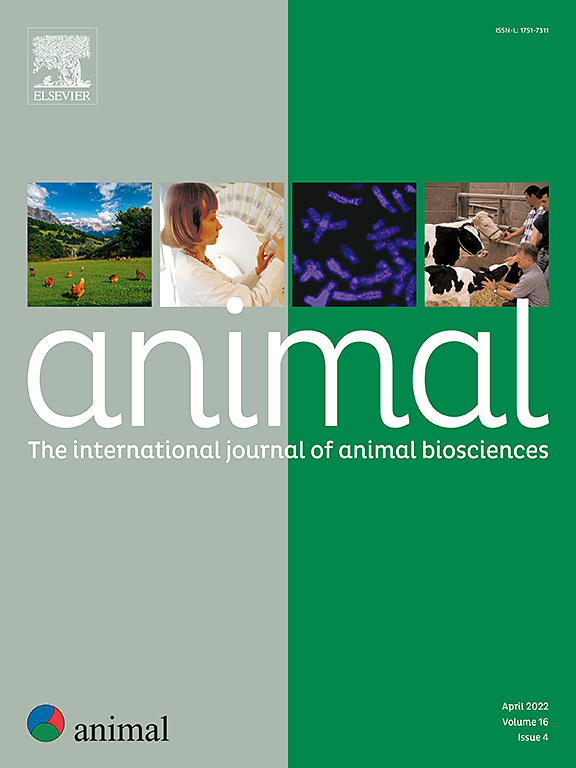综述:昆虫养殖生态系统服务指标——一种新的健康视角。
IF 4.2
2区 农林科学
Q1 AGRICULTURE, DAIRY & ANIMAL SCIENCE
引用次数: 0
摘要
全球农业粮食系统在满足日益增长的粮食需求方面面临着越来越大的压力,推动了对可持续农业实践的需求,以提高粮食系统的效率和抵御能力。昆虫扮演着不同的社会生态角色,可以通过生态系统服务(ES)来解释。昆虫养殖提供了支持粮食安全、生态系统平衡和农业恢复力的可持续战略。“同一个健康”框架整合了人类、动物和环境健康的观点,为理解和管理这些贡献提供了一种有价值的方法。本文综述了昆虫农业提供的四类生态效益——支持、供给、文化和调控,反映了昆虫对生态平衡、健康和农业粮食系统的广泛贡献。这些服务将昆虫养殖定位为改善粮食系统和加强人类、动物和环境健康的多功能工具。然而,尽管有好处,昆虫养殖也面临着诸如监管复杂性、疾病传播风险和潜在环境影响等挑战,需要仔细管理。为了测量昆虫养殖提供的ES,我们综合了文献中的见解,并提出了一套与OH框架一致的结构化指标。这些指标旨在评估昆虫养殖的效益和挑战,为基于证据的政策提供基础,从而最大限度地对人类、动物和环境健康做出积极贡献,同时最大限度地降低风险。本文章由计算机程序翻译,如有差异,请以英文原文为准。
Review: Ecosystem service indicators in insect farming − a novel One Health perspective
The global agrifood system faces growing pressure to meet increasing food demands, driving the need for sustainable agricultural practices that improve the efficiency and resilience of food systems. Insects play diverse socio-ecological roles that can be explained through the lens of ecosystem services (ES). Insect farming offers a sustainable strategy that supports food security, ecosystem balance, and agricultural resilience. The One Health (OH) framework, which integrates human, animal, and environmental health perspectives, provides a valuable approach to understanding and managing these contributions. This review explores four categories of ES provided by insect farming—support, provisioning, cultural, and regulation—which reflect the broad contributions of insects to ecological balance, health, and agrifood systems. These services position insect farming as a multifunctional tool for improving food systems and enhancing human, animal, and environmental health. However, despite its benefits, insect farming also faces challenges such as regulatory complexities, disease transmission risks, and potential environmental impacts, necessitating careful management. To measure the ES provided by insect farming, we synthesised insights from the literature and proposed a structured set of indicators aligned with the OH framework. These indicators aim to assess the benefits and challenges of insect farming, providing a foundation for evidence-based policies that maximise positive contributions to human, animal, and environmental health while minimising risks.
求助全文
通过发布文献求助,成功后即可免费获取论文全文。
去求助
来源期刊

Animal
农林科学-奶制品与动物科学
CiteScore
7.50
自引率
2.80%
发文量
246
审稿时长
3 months
期刊介绍:
Editorial board
animal attracts the best research in animal biology and animal systems from across the spectrum of the agricultural, biomedical, and environmental sciences. It is the central element in an exciting collaboration between the British Society of Animal Science (BSAS), Institut National de la Recherche Agronomique (INRA) and the European Federation of Animal Science (EAAP) and represents a merging of three scientific journals: Animal Science; Animal Research; Reproduction, Nutrition, Development. animal publishes original cutting-edge research, ''hot'' topics and horizon-scanning reviews on animal-related aspects of the life sciences at the molecular, cellular, organ, whole animal and production system levels. The main subject areas include: breeding and genetics; nutrition; physiology and functional biology of systems; behaviour, health and welfare; farming systems, environmental impact and climate change; product quality, human health and well-being. Animal models and papers dealing with the integration of research between these topics and their impact on the environment and people are particularly welcome.
 求助内容:
求助内容: 应助结果提醒方式:
应助结果提醒方式:


